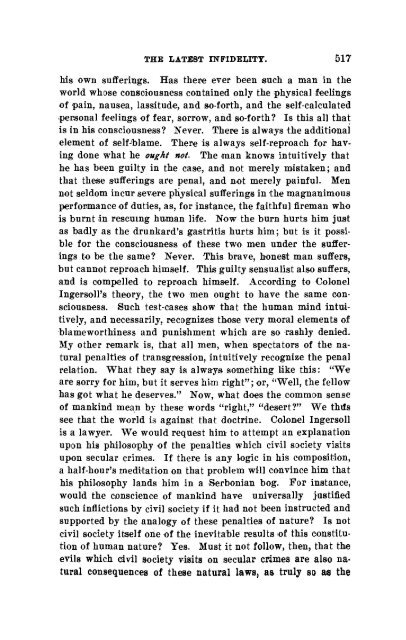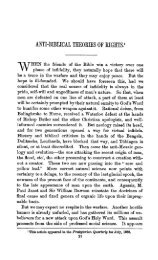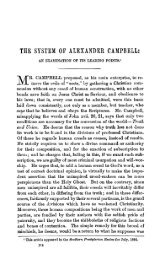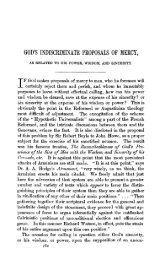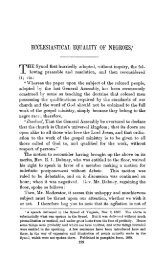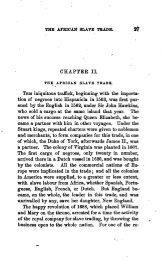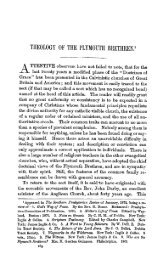The Latest Infidelity.pdf 487KB May 19 2009 - R.L. Dabney Archive
The Latest Infidelity.pdf 487KB May 19 2009 - R.L. Dabney Archive
The Latest Infidelity.pdf 487KB May 19 2009 - R.L. Dabney Archive
Create successful ePaper yourself
Turn your PDF publications into a flip-book with our unique Google optimized e-Paper software.
THE LATEST INFIDELITY. 517<br />
his own sufferings. Has there ever been such a man in the<br />
world whDse consciousness contained only the physical feelings<br />
of pain, nausea, lassitude, and so-forth, and the self-calculated<br />
personal feelings of fear, sorrow, and so-forth? Is this all that<br />
is in his consciousness? Never. <strong>The</strong>re is always the additional<br />
element of self-blame. <strong>The</strong>re is always self-reproach for hav-<br />
ing done what he ought not. <strong>The</strong> man knows intuitively that<br />
he has been guilty in the case, and not merely mistaken; and<br />
that these sufferings are penal, and not merely painful. Men<br />
not seldom incur severe physical sufferings in the magnanimous<br />
performance of duties, as, for instance, the faithful fireman who<br />
is burnt in rescuing human life. Now the burn hurts him just<br />
as badly as the drunkard's gastritis hurts him; but is it possi-<br />
ble for the consciousness of these two men under the suffer-<br />
ings to be the same? Never. This brave, honest man suffers,<br />
but cannot reproach himself. This guilty sensualist also suffers,<br />
and is compelled to reproach himself. According to Colonel<br />
Ingersoll's theory, the two men ought to have the same con-<br />
sciousness. Such test-cases show that the human mind intui-<br />
tively, and necessarily, recDgnizes those very moral elements of<br />
blameworthiness and punishment which are so rashly denied.<br />
My other remark is, that all men, when spectators of the na-<br />
tural penalties of transgression, intuitively recognize the penal<br />
relation. What they say is always something like this: "We<br />
are sorry for him, but it serves him right"; or, "Well, the fellow<br />
has got what he deserves." Now, what does the oommra sense<br />
of mankind mean by these words "right," "desert?" We thils<br />
see that the world 13 against that doctrine. Colonel Ingersoll<br />
is a lawyer. We would request him to attempt an explanation<br />
upon his philosophy of the penalties which civil society visits<br />
upon secular crimes. If there is any logic in his composition,<br />
a half-hour's meditation on that problem will convince him that<br />
his philosophy lands him in a Serbonian bog. For instance,<br />
would the conscience of mankind have universally justified<br />
such inflictions by civil society if it had not been instructed and<br />
supported by the analogy of these penalties of nature? Is not<br />
civil society itself one of the inevitable results of this constitu-<br />
tion of human nature? Yes. Must it not follow, then, that the<br />
evils which civil society visits on secular crimes are also na-<br />
tural consequences of these natural laws, as truly so as the


